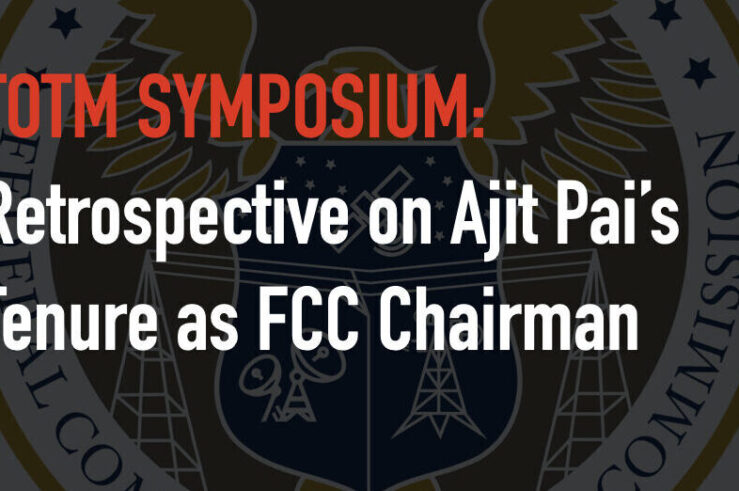Showing archive for: “Net Neutrality”
Introductory Post: Retrospective on Ajit Pai’s Tenure as FCC Chairman
Ajit Pai will step down from his position as chairman of the Federal Communications Commission (FCC) effective Jan. 20. Beginning Jan. 15, Truth on the Market will host a symposium exploring Pai’s tenure, with contributions from a range of scholars and practitioners. As we ponder the changes to FCC policy that may arise with the ... Introductory Post: Retrospective on Ajit Pai’s Tenure as FCC Chairman
What Has Big Tech Ever Done for Us? Part Two
[TOTM: The following is part of a blog series by TOTM guests and authors on the law, economics, and policy of the ongoing COVID-19 pandemic. The entire series of posts is available here. This post is authored by Dirk Auer, (Senior Researcher, Liege Competition & Innovation Institute; Senior Fellow, ICLE).] Across the globe, millions of ... What Has Big Tech Ever Done for Us? Part Two
The Not Neutrality of Tech Reporting: Discussing the Economics of Lifting Data Caps During a Stay-at-home Crisis
[TOTM: The following is part of a blog series by TOTM guests and authors on the law, economics, and policy of the ongoing COVID-19 pandemic. The entire series of posts is available here. This post is authored by Justin “Gus” Hurwitz, (Associate Professor of Law & Co-director, Space, Cyber, and Telecom Law Program, University of ... The Not Neutrality of Tech Reporting: Discussing the Economics of Lifting Data Caps During a Stay-at-home Crisis
“You don’t get to be the umpire and have a team”: should we regulate the activities of digital platforms in neighboring markets?
This guest post is by Patrick Todd, an England-qualified solicitor and author on competition law/policy in digital markets. The above quote is not about Democrat-nominee hopeful Elizabeth Warren’s policy views on sport. It is in fact an analogy to her proposal of splitting Google, Amazon, Facebook and Apple (“GAFA”) apart from their respective ancillary lines ... “You don’t get to be the umpire and have a team”: should we regulate the activities of digital platforms in neighboring markets?
Debunking Elizabeth Warren’s Claim That “More Than 70% of All Internet Traffic Goes through Google or Facebook”
In March of this year, Elizabeth Warren announced her proposal to break up Big Tech in a blog post on Medium. She tried to paint the tech giants as dominant players crushing their smaller competitors and strangling the open internet. This line in particular stood out: “More than 70% of all Internet traffic goes through ... Debunking Elizabeth Warren’s Claim That “More Than 70% of All Internet Traffic Goes through Google or Facebook”
The Mozilla oral arguments and the ongoing hell of the “net neutrality” debate
In the opening seconds of what was surely one of the worst oral arguments in a high-profile case that I have ever heard, Pantelis Michalopoulos, arguing for petitioners against the FCC’s 2018 Restoring Internet Freedom Order (RIFO) expertly captured both why the side he was representing should lose and the overall absurdity of the entire ... The Mozilla oral arguments and the ongoing hell of the “net neutrality” debate
Correcting the Federalist Society Review’s Mischaracterization of How to Regulate
Ours is not an age of nuance. It’s an age of tribalism, of teams—“Yer either fer us or agin’ us!” Perhaps I should have been less surprised, then, when I read the unfavorable review of my book How to Regulate in, of all places, the Federalist Society Review. I had expected some positive feedback from ... Correcting the Federalist Society Review’s Mischaracterization of How to Regulate
Chevron and the Politicization of Law (or, Chevron Step Three)
A recent exchange between Chris Walker and Philip Hamburger about Walker’s ongoing empirical work on the Chevron doctrine (the idea that judges must defer to reasonable agency interpretations of ambiguous statutes) gives me a long-sought opportunity to discuss what I view as the greatest practical problem with the Chevron doctrine: it increases both politicization and polarization of ... Chevron and the Politicization of Law (or, Chevron Step Three)
The net neutrality CRA may be the most tedious piece of political theater ever
At this point, only the most masochistic and cynical among DC’s policy elite actually desire for the net neutrality conflict to continue. And yet, despite claims that net neutrality principles are critical to protecting consumers, passage of the current Congressional Review Act (“CRA”) disapproval resolution in Congress would undermine consumer protection and promise only to ... The net neutrality CRA may be the most tedious piece of political theater ever
Closing the Rural Digital Divide Requires Understanding the Rural Digital Divide
I had the pleasure last month of hosting the first of a new annual roundtable discussion series on closing the rural digital divide through the University of Nebraska’s Space, Cyber, and Telecom Law Program. The purpose of the roundtable was to convene a diverse group of stakeholders — from farmers to federal regulators; from small ... Closing the Rural Digital Divide Requires Understanding the Rural Digital Divide
Net Neutrality Paranoia
The paranoid style is endemic across the political spectrum, for sure, but lately, in the policy realm haunted by the shambling zombie known as “net neutrality,” the pro-Title II set are taking the rhetoric up a notch. This time the problem is, apparently, that the FCC is not repealing Title II classification fast enough, which ... Net Neutrality Paranoia
The destiny of telecom regulation is antitrust
This week the FCC will vote on Chairman Ajit Pai’s Restoring Internet Freedom Order. Once implemented, the Order will rescind the 2015 Open Internet Order and return antitrust and consumer protection enforcement to primacy in Internet access regulation in the U.S. In anticipation of that, earlier this week the FCC and FTC entered into a ... The destiny of telecom regulation is antitrust






